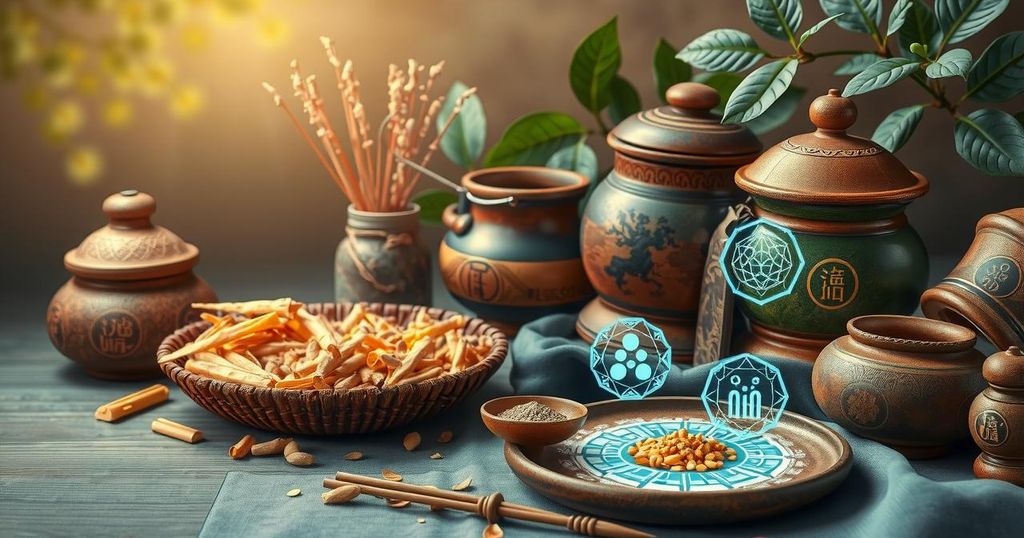AI Empowerment: Transforming Traditional Chinese Medicine for a Modern Era
Artificial intelligence is set to transform traditional Chinese medicine (TCM) by integrating advanced technologies into its practices. Key frameworks identified by WHO categorize AI applications in healthcare into four areas: population health, individual health, health systems, and pharmaceutical innovation. While challenges remain, collaboration among practitioners and AI developers can facilitate broader access and improved treatment personalization in TCM, heralding a new era of integrative healthcare.
In the past thirty years, technological advancements have reshaped our world, especially in healthcare. The rise of artificial intelligence (AI) promises to revolutionize patient care and treatment. As global health initiatives evolve, AI is now categorized into four main frameworks: population health, individual health, health systems, and pharmaceuticals, as outlined by the World Health Organization’s Sameer Pujari.
Moreover, the WHO’s Global Health Strategy (2020-2025) indicates that digital transformation, bolstered by IoT, AI, and big data, is set to redefine healthcare and improve medical diagnosis and treatment outcomes. The Global Initiative on AI for Health supports governance and implementation of sustainable national AI models to enhance health services.
Aiming to synergize AI with traditional medicine, the WHO has formed a Topic Group on AI for Traditional Medicine (TM), facilitating assessment benchmarks and developing AI-based ecosystems. A global meeting on AI in TM showcased insights from various countries, emphasizing how AI can transform traditional practices. Malaysia’s commitment to AI was highlighted through its National AI Office, ranked 22nd in readiness globally.
The integration of AI in Traditional Chinese Medicine (TCM) is gaining momentum, with AI’s data processing capabilities now being used to evaluate ancient texts and clinical practices. This integration aims to establish objective standards in TCM diagnostics and enhance its application in evidence-based medicine. New AI diagnostic tools analyze patient data with precision, proving invaluable in treatment pathways.
Smart devices, such as TCM diagnosis mirrors, enable rapid health assessments. AI also enhances pharmacy practices by ensuring quality and traceability of herbal products, moving beyond traditional sensory evaluation methods. With AI and user-friendly platforms, patients can now track their treatment processes more easily.
An example of AI application comes from Meridian AI Medics, which has developed a TCM AI Brain to assist practitioners with clinical decision-making based on vast data sources. By analyzing clinical symptoms through multiple diagnostic methods, this AI model offers personalized treatment recommendations, enhancing the patient experience and practitioners’ learning outcomes.
However, the implementation of AI in TCM faces crucial challenges. Governance gaps, practitioner resistance, and the absence of interdisciplinary education hinder progress. Collaboration among TCM practitioners and AI developers is essential to overcome these barriers. Educational institutions can nurture future leaders with the skill sets that intersect both TCM and AI.
This AI-empowered future for TCM promises enhanced accessibility, improved diagnostics, and international collaborations. The harmonization of ancient practices with modern technology will not only preserve TCM’s invaluable heritage but also ensure its adaptability in the digital era. The journey ahead presents a transformative landscape for integrative healthcare solutions.
In conclusion, artificial intelligence is poised to revolutionize traditional Chinese medicine by integrating advanced technology into age-old practices. This synergy not only promises to enhance diagnostic accuracy and treatment personalization but also facilitates broader access to TCM services globally. Despite existing challenges in governance and practice adoption, fostering collaboration between AI developers and TCM practitioners will pave the way for significant advancements in healthcare. The confluence of tradition and technology heralds a new era in medicine, ensuring the relevance of TCM in a rapidly evolving digital landscape.
Original Source: www.thestar.com.my




Post Comment